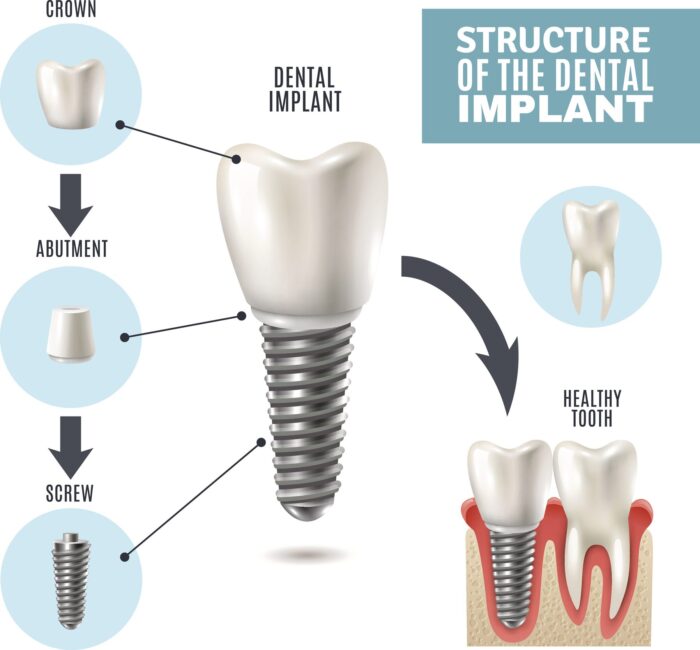Not known Factual Statements About Dental Sense
Not known Factual Statements About Dental Sense
Blog Article
How Dental Sense can Save You Time, Stress, and Money.
Table of ContentsSome Ideas on Dental Sense You Should KnowDental Sense for DummiesTop Guidelines Of Dental SenseDental Sense for Dummies
are clinical tools surgically implanted into the jaw to recover a person's ability to chew or their appearance. They give support for man-made (fake) teeth, such as crowns, bridges, or dentures. When a tooth is lost due to injury or condition, an individual can experience difficulties such as fast bone loss, faulty speech, or modifications to chewing patterns that lead to pain.Dental dental implant systems contain a dental implant body and oral implant abutment and might also consist of an abutment addiction screw. Kids dental. The dental implant body is surgically put in the jawbone in area of the tooth's root. The oral implant abutment is usually affixed to the dental implant body by the abutment fixation screw and extends via gum tissues into the mouth to sustain the affixed man-made teeth
(https://sitereport.netcraft.com/?url=https://nearme.vip)Structure of The Dental Implant System selecting dental implants, speak to your dental provider concerning the potential advantages and risks, and whether you are a candidate for the procedure. Things to consider: Your overall health is an essential consider figuring out whether you are a good candidate for dental implants, for how long it will certainly require to recover, and exactly how long the dental implant might remain in location.
Smoking may impact the healing procedure and lower the long-lasting success of the implant. The recovery procedure for the implant body might take a number of months or longer, during which time you generally have a short-term joint in location of the tooth. the dental implant treatment: Thoroughly adhere to the oral hygiene directions offered to you by your oral service provider.
Things about Dental Sense
Implant failure can cause the demand for another procedure to deal with or replace the dental implant system. Recovers the ability to eat Recovers aesthetic appearance Helps keep the jawbone from shrinking because of bone loss Preserves the health and wellness of the surrounding bone and gums Helps keep surrounding (nearby) teeth stable Enhances lifestyle Damage to surrounding all-natural teeth throughout dental implant positioning Injury to the surrounding cells throughout surgical treatment, such as sinus opening Injury during surgery (for example, crack of surrounding jawbone) Insufficient feature, such as really feeling like the teeth do not bite with each other typically An experience that the tooth is loose or twisting in position resulting from an abutment screw loosening up Implant body failing (looseness of the implant body) as a result of systemic infection, which might be more probable in patients with unchecked diabetes because of neighborhood infection in bone and gum tissues sustaining the dental implant body due to postponed healing, which might be more probable in patients who smoke Problem cleaning up the gums around the implant, resulting in poor oral health Neglected gum disease Post-surgical tingling because of nerve impingement or damage Always notify healthcare service providers and imaging professionals that you have oral implants before any kind of magnetic resonance imaging (MRI) or x-ray treatments.
FDA is not knowledgeable about any kind of adverse occasions reported for MRI or x-ray treatments with oral implants. Oral implants systems are commonly constructed from materials that comply with global agreement requirements of the International Company for Standardization (ISO) or ASTM International. These standards have details of what makes a risk-free product.

A dental implant is a framework that replaces a missing out on tooth. With screw-like gadgets, the surgeon inserts a dental implant into the jawbone, and it works as a support for a synthetic tooth, called a crown. A device called an abutment connects the synthetic tooth to the dental implant. The crown is tailor-made to fit the person's mouth and match the shade of their teeth.
Things about Dental Sense
Some individuals are not eligible for dental implant surgical procedure. It is for dental doctors to run on individuals with: acute illnessuncontrollable metabolic diseasebone or soft Discover More Here cells condition or infectionIf these problems are fixed, a person can have the surgical treatment. In, oral doctors avoid operating individuals with: If people with any of the above undergo dental implant surgical treatment, there is a higher risk of the dental implant stopping working.

Oral dental implant surgical procedure is a tailored process. Give you time to recover. Attach the post and last crown, bridge or denture.
Next, your surgeon will very carefully put the oral implant right into your jaw. Lastly, your surgeon will reposition your periodontals and close the laceration with stitches. If your implant is near the front of your mouth, your dental expert will make a short-term tooth for you to put on till you heal. In this way, you will not have a space in your smile while you recuperate.
Rumored Buzz on Dental Sense
Your company can tell you what to expect in your circumstance. During the healing stage, your jawbone ought to fuse to the oral implant. This procedure, called osseointegration, is vital for security and long-lasting success. This procedure can take anywhere from 3 to nine months. In some cases, it may take much longer.
When your dental implant heals, your dentist can attach the abutment (little port article) and your final reconstruction (crown, bridge or denture). This typically takes concerning one hour to finish and might need a 2nd small surgical treatment. You shouldn't feel any pain during your dental implant procedure due to the fact that your company will certainly utilize medication to numb your periodontals.
Report this page